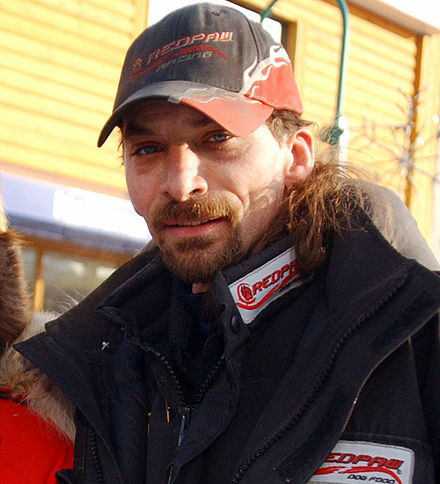Lance Mackey, a tough, perseverant competitor, four-time Iditarod Trail Sled Dog Race, and four-time winner of the 1,000-mile Yukon Quest, died Sept. 7, 2022 after battling cancer, his father Dick Mackey announced. Lance was 52.
Lance Mackey’s Iditarod career started in 2001, when he placed 36th out of the 57 who finished the race. By 2007, he became the first person to win the Yukon Quest and Iditarod in the same year. The next year, he won the Tutumena 200, and continued winning the major sled dog races through 2011. He was a legendary musher who was tough-as-nails against all odds.
“He is thin and resolute, like a chew toy made of jerky. He has a windburned face with ice blue eyes that are often bloodshot, half-moon creases on either side of his mouth, and a brown goatee that’s surprisingly trim and tame. The right side of his face and neck are sunken, the result of numerous cancer surgeries that scooped out most of the tissue between skin and bone. Mackey usually wears a baseball cap—even when he’s mushing, when he tucks it under a fur-trimmed hood—and he keeps his long, infrequently washed hair in a ponytail that stretches down to his spiky shoulder blades,” wrote Josh Dean in Outside Magazine in 2014.
“Because of the frigid winters in the hills north of Fairbanks, where Lance Mackey’s Comeback Kennel sits on five scruffy acres, the massive quantities of bulk meat stacked around the saw require no special storage. Which is also good, since Mackey will have to cut up nearly 6,000 pounds just to provision the two big races he was planning to enter when I visited him in January of 2013: the Yukon Quest and the Iditarod. These brutal, 1,000-mile slogs happen only a month apart, in early February and early March, and it used to be that few mushers would dare to tackle both in a single season. Winning them in the same year was considered impossible—until Mackey did it in 2007. And then did it again in 2008,” Dean wrote.
Mackey was diagnosed with throat cancer in 2001, but raced in 2002, although was unable to finish the race due to the toll of his cancer treatments.
“By 2001, Mackey felt accomplished enough to enter the Iditarod, but he was also troubled by chronic pain in his jaw and neck. He was sure it was just a bad tooth, and when a dentist agreed, Mackey went ahead with the race, only to have the pain become excruciating on the trail. After finishing 36th, Mackey was referred to a specialist, who told him he had cancer—squamous-cell carcinoma, which can be caused by excessive sun exposure or tobacco use—in his jaw and neck,” Dean wrote.
“In short order, a surgeon removed a fistful of tissue from Mackey’s face and neck, as well as his interior carotid artery, his salivary glands, and most of a large muscle that supported his right arm, causing it to go partially limp. Radiation treatments weakened him more. He lost ten teeth, and because neck tissue is full of connecting nerves, he suffered damage to his hands and feet that caused chronic pain and a susceptibility to cold, which poses a problem in his line of work.”
“Lance was a promising junior musher known for a near psychic connection to his dogs, but he went astray as a teenager. As he recounted in his 2010 autobiography, he left the sport, worked briefly above the Arctic Circle at his father’s oil-camp truck stop, and then spent a decade as a fisherman, working and drinking and abusing drugs. He was drifting further away from a decent life when, in 1997, he reconnected with Tonya, an old high school friend whose substance-abuse problems were at least as bad as his,” Dean wrote.
“Tonya had three small children in tow, but Mackey married her inside of a few months and embraced the entire crew. For a short time, the two wayward souls indulged each other’s bad habits. Then, in 1998, they decided to clean up together, picking Lance’s birthday—June 2—as the end of one era and the start of another. He was 27.”
The family moved to the Kenai Peninsula and lived in a beach shack owned by a friend.
“They were so poor that Tonya cut her daughters’ hair short because the family couldn’t afford shampoo. But Lance, Tonya once wrote, “was like an erupting volcano—the energy of his personality had to go somewhere.” Over time he made enough money fishing to buy a piece of land and build a small cabin, and there he reconnected with sled dogs,” Dean wrote.
“Mackey entered sprint races and slowly began to build his own kennel, using, he says, “dogs that nobody else wanted,” plus a single very accomplished bitch, “a trotting dynamo” named Rosie that he bought for $100. He bred Rosie to a star dog from a friend’s kennel, and when it came time to split the litter, he picked first and chose Zorro, ‘a little furball’ mutt who would become the genetic foundation of Mackey’s kennel, the linchpin of some of his greatest teams, and one of the most famous dogs ever to run across Alaska,” he wrote.
Mackey, son of Dick Mackey, one of the founders of the Iditarod race, in recent years ran the “Comeback Kennel” outside of Fairbanks. In 2020, Mackey tested positive for methamphetamine during a routine urine same during the Iditarod, and his 21st place finish was vacated. It was his last Iditarod race. He had struggled with addiction throughout much of his adult life.
In 1990, an asteroid was named after him: Asteroid 43793 “Mackey,” discovered by Carolyn Shoemaker and David H. Levy at Palomar Observatory. Mackey was also the subject of a 2015 independent feature-length film called The Great Alone, which documented his life story and career.
Mackey’s mother, Kathie, passed away in 2019.
